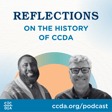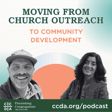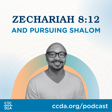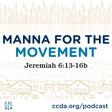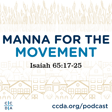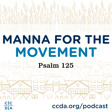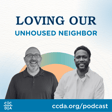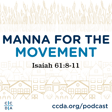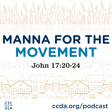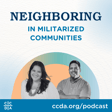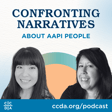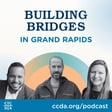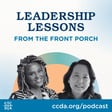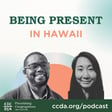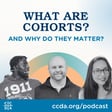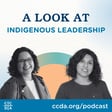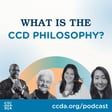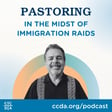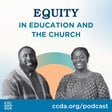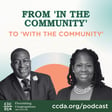Become a Creator today!Start creating today - Share your story with the world!
Start for free
00:00:00
00:00:01

Flourishing Congregations in North Carolina
Lynette McIntosh-Madrigal is joined by James Harrison, Crystal Heilig, and Marcia C. Wilson to discuss how their churches are doing ministry with their communities. They are all members of different AME Zion churches in North Carolina who are also part of CCDA’s Flourishing Congregations Initiative. They share about their experience with the program, how they are listening to their communities, and how they are partnering with their neighbors.
Learn more about CCDA’s Flourishing Congregations Initiative at ccda.org/fci.
Learn more about CCDA and how you can get involved at ccda.org. Connect with CCDA on Instagram, Twitter, Facebook, and LinkedIn. Follow CCDA on YouTube.
Recommended
Transcript
Introduction to FCI and Guests
00:00:09
Speaker
Hello and welcome to the CCDA podcast. My name is Lynette McIntosh-Madrigal and I am part of the Flourishing Congregations Initiative. and serve as the Flourishing Congregations Coordinator here at CCDA and I am your host for this episode.
00:00:24
Speaker
CCDA is passionate about seeing people and communities experience God's shalom. And one way that we're doing this is through the Flourishing Congregations Initiative, or as I like to call it, FCI.
00:00:34
Speaker
This is a comprehensive four-year program designed to empower church leaders to help their congregations deepen their community engagement and enhance their ministries and contribute to the flourishing of their neighborhoods.
00:00:46
Speaker
Today with us, we have a couple of friends of mine from the African Methodist Episcopal Zion Church in North Carolina, or the A&E Zion Church. And with us specifically is Marcia C. Wilson from Holland Chapel, Amy Zion, Crystal Heilig from New Hope, Amy Zion Church in East Spencer, in North Carolina, and James Harrison from St. James, Amy Zion Church in Leland, North Carolina.
00:01:11
Speaker
Well, Crystal, James, and Marcia, thank you so much for joining us today. We truly feel honored to share and hear your stories with our listeners joining us here and being able to learn more about community development and what's happening in North Carolina.
Personal Stories and Community Ties
00:01:27
Speaker
I'd love for you to just share bit by yourself. Where is your congregation today? Where are you geographically located? And maybe you just some fun stuff. My name is James Gresson from St. James' Amy's Antiris in Leland, North Carolina.
00:01:39
Speaker
My pastor is Carol Robbins, and I'm about 15 minutes from the beaches. We have several beaches located, and I like playing golf on my days off, which I'm retired, but so most of my days off I'm playing golf.
00:01:52
Speaker
I think that's about it. Thanks. Sister Crystal? Hello, my name is Crystal Heilig. I am Spencer, the East Spencer, Spencer area of North Carolina.
00:02:05
Speaker
That's about two hours from Marcia in the center of the state, an hour north of Charlotte. Hi, I'm Marcelle Wilson, member of Holland Chapel A.M. Zion Church in Apex, North Carolina.
00:02:17
Speaker
We're located about 20 minutes from Raleigh and about an hour from Greensboro, North Carolina. One of the fun facts about me is that I like to play video games, again, whether it's on my phone or Nintendo at home, even going into a store. If I see a machine, I will walk over there to see if it's one of the games that I like and start playing.
00:02:37
Speaker
I love games. Like, I love ah picking up. I love going to Barnes & Noble and just looking at the board game session. It's one of my favorite things. Things are giving us that tidbit. I'm curious to know, have you always lived in those communities that you all mentioned?
00:02:53
Speaker
Well, I grew up here in Leland. But after high school, I moved up to New Jersey and got vested into the military. And after staying in the military, I only came back here in North Carolina. and the so And so 74 years later, still here.
00:03:09
Speaker
Wow. Raised your whole family, planted roots, chose to stay. Yeah. Beautiful. Crystal, what about you? I went away to college, so ill I'll say I lived in the Chapel Hill, Raleigh area for about five or six years.
00:03:27
Speaker
And then I lived in Charlotte for a about 10 years um off and on. And then like like young kids do, we leave and we come back a little bit and then we leave again trying to assert our independence, but finally came back to the Spencer area for good when my grandmother passed in 2017. So I've been here ever since.
00:03:48
Speaker
Oh, okay. i like I totally identify with that piece. Although I think a bit different for me is i just stayed in the college area for years. And so, oh, that's beautiful. Marcia, what about you? Have you always lived where you're at?
00:04:03
Speaker
I actually do not live in Apex. I was raised in Apex. ah For the last 15 years, I've lived in Fuquay, Verena, which is about 45 minutes from my church. So like most of the members my age at that time, we went off to college, kind of stayed in the college area, but we did commute back and forth to our church, our home church, as we call it.
00:04:25
Speaker
So currently now I do it commute 45 minutes to church on Sundays. ah everyone Everyone's always asking, can't you find a church nearby? I'm like, no, that's my home church. ah No, but I've lived in Apex for about 30 plus years in between college and now I'm i'm in Fuquay.
00:04:44
Speaker
Wow. That's incredible. Crystal, I want to go back
Returning and Re-engaging with Home Churches
00:04:47
Speaker
to you. and You grew up in Spencer, left to college, and came back. Yes. So I think I would say like in the CCDA world, there's this like term called returner, right? Where you grew up in a specific community.
00:05:01
Speaker
you go... do what you got to do and you come back. What was that coming back like? I'm curious. Home is home, right? But I would say having to interact like for more than just a visit, you know, you have to re-navigate relationships because the last time people saw you, you might've been 16.
00:05:21
Speaker
And so you may be like kind of asserting yourself as an adult. You know, sometimes people don't necessarily see you in the capacity of like a working professional who knows things.
00:05:31
Speaker
You know, but once I figure it out, they put you to work like immediately. Oh, you know how to do that? Come over here. To a certain extent, we're almost getting to know each other all over again. ah that's beautiful.
00:05:42
Speaker
How about both of you? Do any of you relate to that experience of like returning back to a place where you once were? I did, because when i went out one when I went to college, there was a huge gap between attending my home church, Holland Chapel, versus staying on campus and attending church on campus. So when I graduated, I still did not return directly back to Holland, so maybe about a five to ten year gap. so when I came back, it it was like reintroducing myself.
00:06:12
Speaker
two members, you know, there were some people that said, well, who is she? They didn't know me, but they knew my family. So i I can relate with Crystal with that, coming back, reintroducing yourself. And like she said, they they're ready to put you to work.
00:06:25
Speaker
It's funny because when I moved back into this area, I was going to school as well as working at the same time. And now so, you know, going to school, you know, and the business for business, I decided, well,
00:06:39
Speaker
You know, I got raise my daughter. I had one child, one daughter. And, you know, during that time of raising her, it was an opportunity for us to raise her up in the St. Jamie's Design Church, where I grew up in, pretty much.
00:06:53
Speaker
And so it was easy work as well as go to school, but also get her grounded in what she's supposed to be grounded into. It was a challenge. i hear I hear this theme, it was hard to reintroduce ourselves back, right? Because we've changed. We've, in many ways, ah physically changed, but also like in our own minds. And it's hard for people to like see us change as well.
00:07:15
Speaker
But I'm curious, how was it coming back? Did your community change? And how was how was that for you It was difficult for me when I came back. I guess yeah it it was difficult because i couldn't relate to people that went for at one point.
00:07:29
Speaker
I couldn't relate to them. I've been waiting for a while. and And so I was more or less not wanting be around people just to some extent for a while. And it was because of some of the things that are taking place in life. and And after being reintroduced, and I guess would say the biggest thing was being reintroduced to Christ.
00:07:50
Speaker
And getting that at that point, getting more grounded in what I had gone through, what I experienced. And that allowed me to venture out a little bit more and gain more, would say, more a relationship with people, having a more relationship with people.
00:08:04
Speaker
At one point, I shied away from that. i didn't want to be a part of a relationship at that point because so much things that were taking place. You're looking back at a time. What year was that that you're looking back at?
00:08:16
Speaker
I moved back here in 73, so I got out of the military in 73. Wow. We were going through the Vietnam War and those type things, and it was so hard to deal with some things at the time.
00:08:28
Speaker
That's really pointed at what James is saying because he's talking about a war experience. And when you have an experience that powerful and then try to relate to people who haven't been there and maybe who haven't even traveled from their original um hometown, that' like that's a big deal. That's something.
Generational Differences in Church
00:08:45
Speaker
I think mine is a little more... not quite as severe, but it's still, you know, differences in age. You know, right now, most of the people in my church, I'm a young'un in the church and, you know, not young. So, you know, I'm dealing with folks who are a lot older than me, who maybe haven't been exposed to the same sort of technology.
00:09:06
Speaker
So it's always this navigating, like picking your battles, right? Because they're still my elders. I still have a lot of respect for these people and they don't care how much I know, right?
00:09:18
Speaker
They want to do what they're comfortable with. So, you know, it's a lot of very gentle nudging and maybe even sometimes waiting until there's an opportunity to reintroduce a subject.
00:09:31
Speaker
People see value at different times. And sometimes I'm like, wait, they're not going to get that until you know they see the value in using electronic forms of payment.
00:09:41
Speaker
It's little things. I'm curious to know, in your communities, as you think about like inside your church and even outside, as you think of i want you to visualize like walking through.
00:09:52
Speaker
what are just some signs of hope you see in your community and just some signs of need? I would say, you know, to keep a strong relationship with the community, especially with the younger folk, and to see the church as, you know, as trying to do better toward them and help them more because of our young folk really need the support of the older folk.
00:10:14
Speaker
And not now I got an example is ah we got a ah young lady that Her minister, her name is Dr. Bannerman, and she makes sure the children get to go to church and, you know, if she pick them up and bring them back to to church, you know, and take them back home.
00:10:30
Speaker
And any the other the activities going on in and around the community, know, she makes sure their kids get there, you know. And we, I call the wise folk, the older of folk, I call them the wise ones. Like I said, I'm 74 years old. And I call those folk above me, I call them the wise ones because, you we're trying to pave way for what we've gone through to make sure they don't have to, you know, fall in those steps that we've fallen into.
00:10:56
Speaker
To see the need of what they're going through and and and feel the the pain that they're going through, what they're experiencing, know. So I see the hope of What we're trying to accomplish with the young children is not leaving the older ones out as well. you know Yes.
00:11:11
Speaker
how do you How do you feel like the young people respond? We have some programs where you know the children come up and ask, can i be a part of it? I'm the videographer of the church, and I'm the photographer of the church.
00:11:25
Speaker
And I try to allow those children to come up and do the recording, do the videoing. Because yeah in order to allow them to do these things, and I mean, that's, you know, you might not want to do for life, do it for my wife, for a job, but it's some experience. I mean, something to give back.
00:11:40
Speaker
I went to school for these things, but I wanted to share and make sure that they had those opportunities. I love that. How old are these young people? Some of them are 12, 13 years old. They'll come up to me and say, Mr. Harrison or Mr. Z, can I do the video of that? Sure, why not?
00:11:56
Speaker
Try to keep them encouraged. Set the example for them. Even when we have you know things at the church like serving the folk. They'll come and ask, can I serve? you know Can I serve them the drinks?
00:12:07
Speaker
That's a good thing. What about you, Marcia?
Community Engagement Initiatives
00:12:10
Speaker
I think I'm going to approach the more of the signs of needs. Because one thing about our church, again, there is an age gap. There's more um seniors. There's probably about 60 plus seniors. And then everyone else falls below that.
00:12:23
Speaker
One thing that we've noticed recently, we have a new pastor, Reverend Daquan Bindo, and he's he younger as most of the seniors said, he could be their son or their grandson.
00:12:34
Speaker
But he's brought a lot of excitement to the church, and i think the membership has grabbed hold of that. And now there's talk, there's communication with not just the seniors, but also the younger members of the church. It's like, what's next? what As he says, we're going to a new level, the next level. And I think everyone's grasping a hold of that. Hey, we're ready to go to the next level.
00:12:54
Speaker
And we also notice there's a need in the community. What can we do for the community What our community, what can we do to impact our community? So that kind conversation is open through the FCI you know philosophy, as well as the information that we're getting from Dr. Broom and Dr. Armour on our monthly calls.
00:13:11
Speaker
And I think Hollins is at the... and Right now at this moment, we're we're excited and we're looking forward to what we're going to do for our community, our surrounding area. Again, we're in Chatham County.
00:13:22
Speaker
We're more so on the Wake County side, but we're looking at making an impact in Chatham County. So the need, we also know there's a need for food banks. There's a need for the children at the school. ah We're looking at a literacy program. How can we be impactful to the the younger kids who are in grades? I believe it's K through third grade next year, summer literacy program. We're now exploring that opportunity among other opportunities with the seniors in our and our church and not outside our church as well. So the conversation has started and we noticed there is a need and we're hoping to be able to fulfill some of that need in our community.
00:13:57
Speaker
Oh, I love that you already and kind of introduced us to and started having, ah yeah, you're having a conversation about like the Flourishing Congregations Initiative that is kind of helping us put language to what we're already doing and seeing in our communities.
00:14:11
Speaker
How has that been so far when it comes to the CCDA philosophy and learning about the CCDA philosophy and then thinking through like what's going on actively out in our neighborhoods? Yeah.
00:14:22
Speaker
For us at Holland Trap, our leadership team, we're starting to introduce the FCI philosophies. We're taking baby steps. A part of our team, we have young, some of the younger members of our church. I think their age is from 20 to 35, including our pastor who's in his early 30s.
00:14:39
Speaker
And then we have our seniors who are, wouldn't say they're seniors, they're like 60 and up. But we kind of did a mix of both age groups. But I think right now we're kind of reintroducing them to the philosophies and letting them know, hey, what FCI is, what the VCDC is.
00:14:56
Speaker
And then as we're looking at opportunities in our community, we're trying to find ways where we can be part of the Sunday service, just know a little bullet here about the LCI and the VCDC program.
00:15:09
Speaker
So we're taking small tests. We're trying to figure small steps, right? And we're trying to figure out how we're going approach this going forward as we continue introducing the philosophies and also getting more members of the church involved and buying into that philosophy and saying, hey, we can make a difference in the community.
00:15:25
Speaker
When you said, you know, it gives us language for some of the things that we see. You know, for since COVID, people have started talking about like unchurching. And that's reflected in a lot of the Amazon churches. There's 16 Amazon churches in this area, which is a lot.
00:15:41
Speaker
Right. And there's plenty of space to sit, you know, in in and every one of them. You can come in and not worry about it. And that may or may not change. That's happening all across the country.
00:15:55
Speaker
But what we do know is we still have to find a way forward. And I think that Flourishing Churches initiative gave us a way to engage people that necessary that didn't involve the outside world changing. It involved us changing and that we can control.
00:16:11
Speaker
You know, we can control how we talk to people. We can open the door. And if people aren't going to come in the church, okay, we're going to have to go outside. right And we're going to have to kind of be a little bit less strict in how we structure.
00:16:28
Speaker
Because the Amazine churches, the Methodist churches, they put the method in Methodist. Everything is very strong. So we might have to loosen up a little bit.
00:16:39
Speaker
And so I think that FCI gave us that. All of the other things that are impacting the other communities impact our area too. you know, there's homelessness. when When you have folks that are unhoused, then you can see that there's a lot of need for mental health support.
00:16:55
Speaker
There's a lot of need for addiction support. And you know just in general, because of this the state of the economy, there's just a lot of general need. The signs of hope that I see in places where we see that we might be able to use the CCDA philosophy to re-engage is that there are buildings going up. you know There are homes, and they're not those homes where you see people will take a small home and build another entire home on top of it.
00:17:21
Speaker
We see people rehabbing existing homes so that people in our community could possibly be able to afford them. So how do we support that? You know, how do engage people so that they don't believe that the church is a fortress,
00:17:36
Speaker
you know, that that that they're only welcome if they show up a certain way, you know, i friend people, you know, befriend them and show up as you know, we want to, we want to be a partner with you. We want to engage you as a, as an equal, you know, not as somebody who's just immediately going to pounce on you and tell you all the ways that you need to change.
00:17:55
Speaker
man I love that. I love that you even introduced that language, right? Like I mean, think many times you can be in and for, for the community, which are good things, right? Like i don't want to discount the good work that doesn't, God uses all things, right?
00:18:10
Speaker
But what would it look like if we were with the community, right? And maybe our brothers and sisters that are outside those church walls seeing us be with them. And so 100%, like i hear you. and Yeah, it' it's also change in our own lenses, right? you're You're talking about like, we need to change. And sometimes that means putting different glasses on to seeing people viewed in the image of God and seeing them differently.
00:18:35
Speaker
The parish congregation, didn't say anything about it, but I'm really not sure how we first came about, you know got into it, but I thank God we did. of 20, I think out of 20 churches, we've been one of them chosen to participate.
00:18:48
Speaker
and And being a participant, it opened our eyes up to other things, you know, to help us, you know, explore and see other like-minded folk do the same thing we're trying to do. And and I think um ah think I was really exposed to when we went Portland.
00:19:05
Speaker
how I saw things taking place, you know, and being around like-minded folk, I mean, that's the goal. I mean, people are thinking the same thing you're thinking and you just don't know how put it in perspective, but after you start talking with them, you can see things and you see them further, you know, and that's how we can accomplish a lot of things if we work together and share ideas with others. And I think that's what we are.
00:19:27
Speaker
And the other part of was to be a stronger force in the community. You know, we are a stronger force in the community, making the difference and pouring out our resources from where we get resources from we can share with the folk in the community.
00:19:40
Speaker
And think that's what we continue to do. You I think says, be that good Samaritan. what And whatever you do is be that good Samaritan. Portland was so significant because we get to be with a group of people who are able to put language to the feelings and even the tensions that are coming from within, right? Where it's like, you know you mean redistribution is a thing that we should be sharing resources and that sometimes is a bit scandalous, right?
CCDA Principles in Action
00:20:06
Speaker
This like, if we think about the book of Acts on the way that people were given and no one had need and you're saying that people gave in a way that, you know, it's so...
00:20:15
Speaker
things like that. I'm like, yes, I get so inspired and encouraged by those conversations too. And I'm just like thinking about ah the CCDA philosophy that is grounded in biblical principles. I'm thinking about like reconciliation, redistribution, relocation, leadership development, empowerment, church-based, right?
00:20:35
Speaker
Listening to the community and the holistic approach. Of those eight, and as if you've been learning about them, we did the philosophy and community series in January and February. And I'm sure that you've been having conversations in your monthly AME Zion monthly cohort meetings.
00:20:51
Speaker
What of those personally for you and for your congregation, what have been some that like have felt easier and more you're more drawn to? And maybe some that you've maybe wrestled a bit more. I'm going to say reconciliation and and under that you know that concept of Shalom, the place where nothing is missing and nothing is broken resonates with me because you know as we're trying to figure out how we're going to move forward with with flourishing churches and within with the projects that we want to do we have to and our church has to consider our capacity.
00:21:22
Speaker
We're a small, older congregation. So what can we what can we build and sustain? right? So when you look at nothing and missing and nothing broken, that means let's consider what we have.
00:21:36
Speaker
You know, there's a lot of wonderful ideas, but some of those things are a little bit out of reach for us. What do we have right here? And what can we use tomorrow? What could we do tomorrow, right? Maybe not in the capacity that we want to. What do we have the skills to do the place to do tomorrow that would fulfill our mission?
00:21:56
Speaker
we don't Nothing is missing. Nothing is broken. We just have to do the inventory to figure out what we have and how we use what we have. I love that. What do we do tomorrow and how do we use what we have?
00:22:08
Speaker
What a beautiful way to put it. What about the rest of us? Well, we started partnering with different people, doing partnership. And East North Carolina Food Bank was one we partnered with. I mean, we were sort of in an area where we were just doing, we were working with doing anything.
00:22:27
Speaker
I mean, we were physically in the church, but we weren't serving the community, I'd say. And once we went to the, well, and then we started talking with with different folks, and talking to Dr. Armand and Dr. Brome, we started partnering with the Food Bank.
00:22:45
Speaker
And when we started partnering with the food bank, we saw so many folk come out to gain, to get something. They only got food that was available, but they got so the word of God.
00:22:57
Speaker
oh They got the shared meal and free clothes. ah It was a bunch of things available to them. So it gave the church, it gave us, everybody that participated, volunteered, everybody that came out,
00:23:13
Speaker
they walk away in a different way. you know ah We look at things differently. And we do it every month now. we're we're in We're in the process of doing it every month.
00:23:24
Speaker
Every Tuesday of every month, we do this food bank food drive. And the community loves it. And what we we're saying, we if and we can just do something We might not do it all at one time, but we are doing something to make sure that we if we are missed, we are thought of.
00:23:42
Speaker
And so if we are missed, they say, well, what happened to St. James? What happened to those folk there? you know I missed them. you know Could we get them back? Could we get somebody back my be in place to help us on this way? Because When I was naked, did you close me? When I was hungry, did you feed me?
00:23:58
Speaker
you know And so we're trying to pull back in the community and making sure that they get all the information that we have pointing out to them because that's necessary. A welcoming church, I'll put it.
00:24:09
Speaker
I love that. It reminded me of this saying, like if our church were gone tomorrow, like would people notice? right And it's says like, what what kind of image and legacy do we want to leave behind? And would people care if we were gone?
00:24:22
Speaker
the kind of impression we're trying to leave. It kind of even reminded me of like this empowerment. You kind of alluded towards this agency. Sometimes food gives agency. right We give people an opportunity for that next step.
00:24:35
Speaker
They become part of the volunteer base at times too. right They become the ones like, actually, can help you out next week? like I want to be part of that. I know ah Dr. Armour says that it is it His doors church doors are open. It it sounds like 24-7.
00:24:50
Speaker
And they do they do a lot over there at St. Luke. Beautiful. Having an opportunity for the folk to come out to choose the food that they want. I mean, it's available to them. you know what yeah They get what they want.
00:25:03
Speaker
I mean, take it and go. you know it's It's not that we're giving them, making put it a bag. They get their cart and pick up what they need and we help them take their cart and put it in the cart for them, whatever the case may be. And so it's a blessing to be able to these things for folk. Yeah.
00:25:18
Speaker
That's dignity, right? Like they get to choose what they want. It's like if I'm going to food distribution, i would want some beans. I don't know what to do sometimes with specific meals. Like if somebody gave me an eggplant, five eggplants, I'm like, whoa, I don't know.
00:25:32
Speaker
It matters to give that give up people food that is is culturally relevant. Culturally relevant. Yes. I heard it. In Portland, you know, last year, and it stuck with me, is that we do things for people, not to them. Right. And a bag full of eggplants that you don't know what to do with is doing something to them versus the beans, which you know what to do with that.
00:25:58
Speaker
hmm. That's right. Marcia and Crystal, do you also have um food distributions at your congregations? We don't. We don't. It's something that that we're looking at. You know, how can our small group pull that off? And it may involve some partnerships. Like, it may not be just us.
00:26:13
Speaker
You know, we may have to develop some partnerships to get that done. right We have done it in the past. There was maybe about two years ago, we did distribute chicken. I believe it was every two weeks, all you know legs, breasts, tenders, and so forth. So we moved away from there because that particular agency had changed some of their guidelines.
00:26:34
Speaker
So we discontinued that, but we are looking at that going forward. I think one of things with the CCDA philosophy that we're trying to lean on right now is listening to the community.
Community Partnerships and Impact
00:26:43
Speaker
What is the community needs?
00:26:45
Speaker
I was able to find a organization in Chatham County called the Chatham County Alliance, which they meet once a month, different organizations who are coming together and partnering, trying to partner different groups together and say, hey, there's a need over here. Can you meet that need?
00:27:01
Speaker
And actually they're going to have a meeting in about two weeks. And the the lady sent me an email. She said, would you be willing to join this alliance? And I said, absolutely. You know, that gets us at the table. to hear what the community needs and how our church, Holland Chapel, can be resourceful to them and and we can make impactful partnerships.
00:27:18
Speaker
So we're listening. We're listening to the community. I love that, which is just just on brand for our last couple webinars that we've had. Our latest webinar with Daryl Anser over in Kansas City, he shared about listening to the community. And right before that, we had the Carters in April share about listening the community some as well. And I feel like even shaped the way that I think about possibility in my neighborhood.
00:27:42
Speaker
The Carters shared in their webinar about this image of a fridge. Like they have a community fridge in the neighborhood. And I was just like, how would I make this work? I'm wrestling, right? There's like this internal wrestling and there's this like dreaming that's happening. What if I thought that large? And so I'm curious to know, as you, as we've like been diving deeper into listening to the community, you've been challenged to listen into the community. And like and so what images have been coming up for you or what has sparked I remember that, Fred, when I had the same reaction, like, whoa, that's amazing.
00:28:17
Speaker
And I was like, I don't think I could ever get my congregation to agree to that. And they didn't, but they agreed to do a blessing box, like it's something like a cabinet where people could go in and get what they wanted.
00:28:31
Speaker
you know and so different organizations of the church have agreed to keep it stocked. you know And then as depending on how successful it is, think we'd like to start a campaign to see if we can challenge the other Zion churches to do it as well.
00:28:44
Speaker
Oh, I like that. And what's inside? Anything dry goods, right? Rice, beans, tuna, anything that non-perishable. I love that.
00:28:56
Speaker
We have a lot of retired teachers in our congregation. So they were are really excited about possibly doing like a tutoring program, i trying to figure out what that looks like. So whether it's a summer reading program or whether we we can partner with the schools to try to identify kids who might need a little bit of support with with reading, you know with all of the testing that has to get done. Mm-hmm.
00:29:22
Speaker
You know, as far as determining how our congregation is equipped, we have a lot of teachers who are fired up and ready they sort to sort of jump in and and use those skills again.
00:29:34
Speaker
we just want to do it in a way that's sort of organized and where we can, you know, identify the children that need that support. Yes. Yes. And for our listeners, having no context, to what we're sharing is we're talking about a webinar that we recently released that also available in our CCDA store with Reverend Anser. And he shared about his congregation and how his congregation is on the move to love their community and contextually care about the needs of what's happening for their neighbors.
00:29:59
Speaker
And so one of them was an electronics tech lab of sorts that this church puts together, right? And they invite teachers and instructors to help young people learn about how to do coding, I think was one of those things, right? Like they give opportunities to learn. And I just thought it was ah such a creative and empowering way for young people who sometimes don't always have access, right? Like sometimes access is the issue. We don't always have access for people to have the opportunities to explore in that way. And thought that was beautiful.
00:30:31
Speaker
Ah, that's beautiful, Crystal. Thanks for sharing. I would say one of the challenges for our church is probably the location. We are in a rural area, even though it is in Apex. We're on the side of Apex that's currently being redeveloped in a sense. There's a ah big development that's coming in and they're bringing a lot of homes and companies, businesses to the area. But the location of the church is a rural area. So we're actually to have to get out and get into the community so that most people probably, they know there's a big church back there in the woods.
00:31:03
Speaker
But as far as what we do, they're like, hey, that that's Holland Chapel back there. Go down that road. ah It's a big church back there. But we want to make an impact that people not only know where we are, but what we are doing to make an impact with the community. But we're going to be challenged because of the isolated area that we're in.
00:31:19
Speaker
There is a high school and a elementary school, maybe about 10, 15 minutes away. But when you go down those back roads, it's like, well, where's the churches and and where they're making an impact? So not only are we listening to the community, we have to let them know, hey, we're here. We're here for you. And this is where we look at it.
00:31:35
Speaker
we ah Our doors are open. you know we We do have every election year where we host the common vote. We do to back the back to school. We partner with other churches in the community, about five churches in the community. We have a back to school event.
00:31:49
Speaker
And we also reach out to the McDonald's house. But we actually have to leave our area to make an impact. So we want to be able to bring people to our church. That's the goal as far as making an impact in the Chatham County area for Holland Chapel, hopefully.
00:32:05
Speaker
Absolutely. And i love that. And a part of it too is like listening to developments that are happening and are they serving those that are in the rural community, right? It's like, are is it accessible, right? As people, sometimes rural communities are a bit more sprawled out, right?
00:32:19
Speaker
I grew up in a rural community in Orocy, California. And I tell you, we had to always drive out 30 minutes out just to get groceries. like the Because within our own little town, the groceries were a little too high price.
00:32:31
Speaker
Yeah. So we drove out to the one with the super center, the Walmart. I was like 25, 30 minutes out. So I hear you. want to change gears here and think about we have a couple more minutes left. And I've really enjoyed conversation with you guys. It's felt easy. And I've also loved being part of your hearing your stories and learning more about your communities.
00:32:53
Speaker
As I'm thinking about the Flourishing Congregations Initiative, what is your hope? At the end of it, when you think about it, it's like, what do you hope? What do you hope to learn from this space, from the program, from your peers within the AME Zion denomination, and for your community?
Vision for Church Expansion and Encouragement
00:33:09
Speaker
are my My hope, at least I think for my congregation, is that we expand our idea of what church is and how we're present in the community. I think that's how we grow.
00:33:21
Speaker
think that's how we kind of expand our imagination as far as, you know, if the population outside is dwindling, like how do we reconnect? right How do we reconnect and and expand what it looks like to maybe the idea of being in church is going away, but we can still be the church.
00:33:40
Speaker
We minister in different ways. There is a song, I think every Marcia and James probably know it, that we grew up with in church camp called, that They'll Know We Are Christians By Our Love.
00:33:52
Speaker
And I sort of, the idea is to model that. And you can't do that inside. i mean, you're speaking you're speaking to the times, Crystal. I think you're right. Like we're really, i think, called as believers, as God's body to really demonstrate and show that to our brothers and sisters out in the world.
00:34:09
Speaker
I think one of my hopes is through this initiative with the FCI and VCDC is that we can be an example to other churches that they want to learn more about FCI and how we can make, not only Holland can make impact, but other churches could come aboard as well and and see what we're doing and say, hey, we want to be part of that.
00:34:29
Speaker
whether we're partnering with another church or branching out into, you know, not just Amy Zion, but other denominations as well, where we're more unified working together.
00:34:40
Speaker
That's my hope for our community because we do have United Methodist Church, Baptist Church, Amy Zion, but we can come together as one unit and just continue to expand the philosophies of FCI.
00:34:53
Speaker
it's It's good when people, other people come up and ask you, well, how did you get to do this? you know And then you can reference them to where you got your information from. um And it wasn't surprising me to see some more folks come into Grand Rapids to join in what we do, to learn what we do, to stop by all the churches as we have in our yeah food pop-up on Tuesdays.
00:35:18
Speaker
The afternoon program we have for the children sometime, you So it does surprise me that, you know, it would surprise me other folk would be coming in to ask for that information. And who didn't get in touch with, who didn't get contact.
00:35:30
Speaker
Because it's ah it's not just for us, it's for everybody. One body with many members. Amen. Amen. You have all been meeting monthly together.
00:35:44
Speaker
as part of the AME Zion denomination cohort and within right FCI, you're learning about flourishing congregations initiative. And there are like 22 of you that gather together a monthly together to learn about community development.
00:35:58
Speaker
How do we love our neighbors? was something that you remember and somebody that encouraged or inspired or challenged you? I think for me, we just had a meeting actually last evening and listening to, I can't remember which church it was, but they were talking about how they started the Girl Scouts.
00:36:14
Speaker
And it started getting me thinking like, hmm, you know, could we do that at Holland? Even though we are rural and were we're far away from, a lot of where, you know, the schools and so forth. But I kept thinking, you know, is that something that Holland could, you you know, start looking into where we want to host, you know, sponsor a Girl Scout?
00:36:31
Speaker
So I was inspired by her. as She was saying, hey, you know she was having a meeting and they were moving forward. and And also with St. Luke, they're always telling us something that they're doing with affordable housing.
00:36:42
Speaker
those two Those two churches stood out to me last night, talking about the affordable housing, how St. Luke was, Dr. Armour was saying that first he wanted to build, ah I guess, a building next door. And the membership was like, no, no, no, no. no And then he had to come back and then they settled it on, hey, we're going to do the affordable housing on on their property.
00:36:59
Speaker
um So those two stood out for me last night. I would say even St. James, Mr. James from St. James, You know, they're they've been very active and they're very willing to share.
00:37:10
Speaker
I talked to his pastor and she kind of gave me the breakdown of how they how they set up there their food distribution. There's another church in Maxton where they set up exercise classes.
00:37:23
Speaker
for the folks in their church. And Maxton is a very small um rural community where you know folks may not have access to a YMCA or the funds to access it if it were there.
00:37:35
Speaker
So all of these churches really are doing very different things and just so willing to share. And it helps me try to, you know as i we're searching, because I was envisioning something that was a lot bigger. you know um you know St. Luke is doing affordable housing. like How do we do that?
00:37:51
Speaker
Maybe we're not there yet, but I think we could do an exercise class. Ooh, I love that. i love that you reiterated that, right? Like, what can we do tomorrow? We can't get there yet, you know, but we could do this tomorrow. We could do an extra exercise class. i love that.
00:38:03
Speaker
James? Our goal started out before we became ah part of the BCDC. Our vision was to, I designed, my own pet has but had a vision of a resource center.
00:38:17
Speaker
And so I did the graphics. I laid everything out and drew the building and everything laid out for. And we showed it at the members meeting. And everybody was excited about it and liked it. and But we had ah some more steps we had to take. we had to fill in some gaps.
00:38:32
Speaker
You just can't construct a building that's worth a $2 million building and just put it together and put it up. yeah It requires a lot of work.
00:38:43
Speaker
And we didn't have the right—we got some gifts and talents in the church that can do these things, but it requires some money. And so we couldn't do it alone. So that's why we decided—we thank God for partnering with the FCI and the VCDC to help guide us in the direction we need to go in, because what we want, we got to take baby steps to get it.
00:39:07
Speaker
We first got to partner with somebody to help us get what we ah yeah we were trying to get to. And so but the church is still excited about what we are trying to accomplish in the long run. But first, we got to get there.
00:39:18
Speaker
We got to get there. A lot of other folk got to get on board. got to get some partners in involved. And so that's our goal is to continue to work towards whatever we're working works for and build from that.
00:39:29
Speaker
You know the capacity, you know, we haven't, you know, feel the capacity of what we have yet, you know, to look at the building we're talking about doing it later on. you So as we keep on working and talking to folk and getting people involved in what we we're trying to, know, bind to what we're trying to accomplish, you know, then we'll see the results later on.
00:39:47
Speaker
I might not see it, but somebody will see it. I'd be there in my time, but later on, yeah, I'm looking for the future. Well, I'd love to close this with a final question. And if you could give a word of encouragement as maybe some people who are listening are struggling with, how do I collaborate with another congregation? Or how do I get started in community development? Or I'm stuck.
00:40:09
Speaker
What is a word of encouragement that you would want to offer to our listeners? Not everybody has the same vision as you. Just keep talking. Somebody will listen and somebody will be willing to to jump in there and and talk to you about how they can contribute or how someone they know can contribute. One foot in front of the other.
00:40:29
Speaker
You know, it's a verse in Philippians. I'm not great with my scriptures, but I know it's Philippians. and Basically, that he has done, who has done a good work in you is is faithful to perfect it, right? So just that's that's enough, right? Just keep putting, keep going.
00:40:45
Speaker
Well, I think I will say this. um It goes back to being, you know, having a conversation first, you know, you know, forgot to first address you. I want to be a part of something. You can share a lot of information.
00:40:58
Speaker
And a lot times you will be rejected. lot of times won't be received. And it depends who it's coming from. But once you have a vision that you want to accomplish something, you'll make you put forth the effort to get where you need to be at.
00:41:12
Speaker
In our church, we have a lot of folks that coming now because of the leadership we have. It's getting the word that what God can do and will do. And so when other folk come to visit, they see what we are doing. They see that yeah see our our would state our mission statement, our vision statement, and what we're trying to accomplish, engage in rich and and encourage.
00:41:35
Speaker
And they ask you these questions that you're asking about, how how can I get to where you are? Well, we want to get where we are. We want to go beyond of where we are. you know Have your own vision.
00:41:46
Speaker
yeah And when you got your own vision, then, I mean, you'll be more successful. It'll be more prosperous for you. be more easier for you. One step at a time, like she says. Yeah. And I would say, ah don't give up. You know, like like James said, you know, there's a vision. You know, in this scripture, it says we can do all things through Christ.
00:42:04
Speaker
And my thing is, write the vision and make it plain. And and don't give up. Keep pressing forward. And, build relationships and partnerships, and just you know pray.
00:42:16
Speaker
Pray for resources, pray for help, but definitely do not give up. we We're all different sizes. churches did Churches are different sizes, different congregations, young and old, but I would just say keep pressing for it, don't give up, and pray.
00:42:31
Speaker
Amen. Amen. Thank you, Marcia. ah James and Crystal and Marcia, thank you so much again for just giving us this hour and this time to share your stories, share where you're coming from.
00:42:42
Speaker
Thanks for letting us into your world and into the AME Zion denomination. And so with that, i want to also thank our listeners for listening to the CCDA podcast. If want to learn more about CCDA and get involved or connect with Amy Zion or Marcia Crystal and James, check out their info and bios in the show notes of this episode.
00:43:02
Speaker
And don't forget to subscribe to this podcast on Apple Podcasts, Spotify, or wherever you get your podcasts. This episode is produced by Sarah Kellen in association with Christina Fore. We will be back soon with another episode featuring CCD practitioners who are committed to seeing people and communities experience God's Shalom.
00:43:18
Speaker
We'll see you then.
